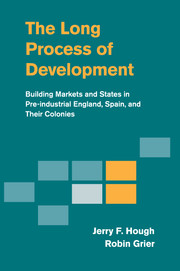
-
Select format
-
- Publisher:
- Cambridge University Press
- Publication date:
- 05 December 2014
- 20 November 2014
- ISBN:
- 9781107479838
- 9781107063693
- 9781107670419
- Dimensions:
- (228 x 152 mm)
- Weight & Pages:
- 0.78kg, 458 Pages
- Dimensions:
- (229 x 152 mm)
- Weight & Pages:
- 0.61kg, 460 Pages
You may already have access via personal or institutional login
Book description
Douglass North once emphasized that development takes centuries, but he did not have a theory of how and why change occurs. This groundbreaking book advances such a theory by examining in detail why England and Spain developed so slowly from 1000 to 1800. A colonial legacy must go back centuries before settlement, and this book points to key events in England and Spain in the 1260s to explain why Mexico lagged behind the United States economically in the twentieth century. Based on the integration of North's institutional approach with Mancur Olson's collective action theory, Max Weber's theory of value change, and North's focus on dominant coalitions based on rent and military in In the Shadow of Violence, this theory of change leads to exciting new historical interpretations, including the crucial role of the merchant-navy alliance in England and the key role of George Washington's control of the military in 1787.
Reviews
'To better to understand today’s developing world, Hough and Grier turn to history. Argument after argument, point after point, they demonstrate the benefits of doing so. This study adds to the legacy of North, Olson, Acemoglu and Robinson, all of whom have turned to the study of political history in an effort to comprehend the economics of development.'
Robert Bates - Eaton Professor of the Science of Government, Harvard University
'How exactly does colonial history shape the subsequent economic development of a nation? The Long Process of Development is the best and deepest treatment of this question that has been penned.'
Tyler Cowen - George Mason University
'Economists and policy makers have ignored the time it takes to foster substantial change in informal institutions that are a sine qua non for economic development and political stability. Synthesizing the classic works of Douglass North, Mancur Olson and Max Weber, Grier and Hough add a temporal factor that illuminates the slow pace to the modern world.'
David D. Laitin - Watkins Professor of Political Science, Stanford University
'To my knowledge, this book is the first, and surely the first serious, attempt to confront the transactions costs-based approaches of Olson and North with the evolved-order approaches of Hayek and Buchanan. The result is a book of signal merit, explaining both the politics of economic development and the economics of political development.'
Michael C. Munger - Duke University
'A development narrative that has both the historical long-view and the granularity of the particular. Their insights will be valuable to all students of development - and a healthy antidote to the fad panaceas of the day.'
Lant Pritchett - Harvard University
'It may sound obvious and trite, yet it is the most underappreciated fact of comparative development: constructing effective states takes time - a very long time. As Jerry Hough and Robin Grier show, the process took more than four centuries in England and Spain. Their analytical history sheds light on why the norms and practices that sustain modern states require long periods of gestation to become solidly entrenched. This is a book with critical implications for today’s state-building efforts in the developing world. It warns us not to expect miracles and teaches us that chance, contingency and time all play a larger role than we typically allow.'
Dani Rodrik - Institute for Advanced Study, Princeton
Contents
Metrics
Altmetric attention score
Full text views
Full text views help Loading metrics...
Loading metrics...
* Views captured on Cambridge Core between #date#. This data will be updated every 24 hours.
Usage data cannot currently be displayed.
Accessibility standard: Unknown
Why this information is here
This section outlines the accessibility features of this content - including support for screen readers, full keyboard navigation and high-contrast display options. This may not be relevant for you.
Accessibility Information
Accessibility compliance for the PDF of this book is currently unknown and may be updated in the future.


